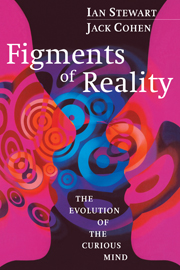Book contents
- Frontmatter
- Contents
- Preface
- Figure Acknowledgements
- Prologue
- 1 The Origins of Life
- 2 The Reductionist Nightmare
- 3 Ant Country
- 4 Winning Ways
- 5 Universals and Parochials
- 6 Neural Nests
- 7 Features Great and Small
- 8 What is it Like to be a Human?
- 9 We Wanted to Have a Chapter on Free Will, but We Decided not to, so Here It Is
- 10 Extelligence
- 11 Simplex, Complex, Multiplex
- Epilogue
- Notes
- Further Reading
- Index
Preface
Published online by Cambridge University Press: 11 August 2009
- Frontmatter
- Contents
- Preface
- Figure Acknowledgements
- Prologue
- 1 The Origins of Life
- 2 The Reductionist Nightmare
- 3 Ant Country
- 4 Winning Ways
- 5 Universals and Parochials
- 6 Neural Nests
- 7 Features Great and Small
- 8 What is it Like to be a Human?
- 9 We Wanted to Have a Chapter on Free Will, but We Decided not to, so Here It Is
- 10 Extelligence
- 11 Simplex, Complex, Multiplex
- Epilogue
- Notes
- Further Reading
- Index
Summary
Isn't it strange that the animal we used to be developed into the creature that we now are? How – and why – did human intelligence and culture evolve? How did we evolve minds, philosophies and technologies? And now that we have them, where are they taking us?
The orthodox answer to these questions looks inside our brains to see what they are made of and how the various components operate. This leads to a story based upon DNA biochemistry, the evolution of nerve cells as pathways for sensory information, and their organisation into complex networks – brains – that can manipulate neural models of natural objects and processes. Mind is seen as a property of an unusual brain – complex enough to develop culture – but here the ‘reductionist’ story starts to lose its thread. Many people see mind as something that transcends ordinary matter altogether. Philosophers worry that the universe around us may be a figment of our own imagination.
In Figments of Reality we explore a very different, but complementary, theory: that minds and culture co-evolved within a wider context. Every step of our development is affected by our surroundings. Our minds are rooted in ordinary matter; they are complex processes – or complexes of processes – that happen in material brains. Our brains are linked to reality by their molecules; but they are also linked to reality on another level, their ability to model reality within themselves.
- Type
- Chapter
- Information
- Figments of RealityThe Evolution of the Curious Mind, pp. ix - xiiPublisher: Cambridge University PressPrint publication year: 1997

